#image credit John Harrison
Explore tagged Tumblr posts
Text
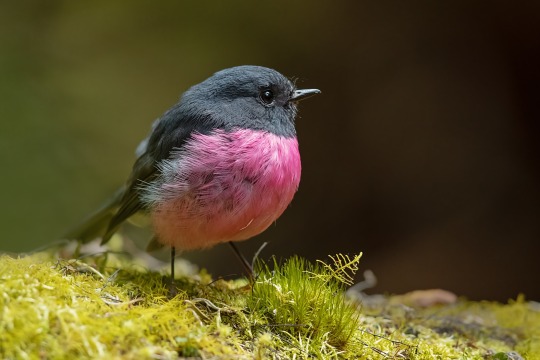
pink robin (Petroica rodinogaster)

Just a guy talking to his rods
#tangotek#hermits as birds#mcyt as birds#creative commons#image credit john harrison#yes it’s real#yes I love it
369 notes
·
View notes
Photo

George Harrison and Astrid Kirchherr in London, 1964; photo by Max Scheler.
Remembering Astrid Kirchherr on her birthday.
“I visited Stuart [in Liverpool]. And then George came up to me and said, ‘Could you please cut my hair like Stuart’s?’ But the other two didn't want to know about it, John and Paul. And Pete couldn’t have the hairstyle anyway because he had curly hair. But a little bit later John and Paul went to visit an old friend of ours, another German photographer called Jürgen Vollmer, and he persuaded them to have their hairstyle changed. And so they came back from Paris looking like the rest of The Beatles.” - Astrid Kirchherr, NPR Fresh Air, 2010
“[George] always treated me with so much sweetness. I think he understood real love, deep love, more than the others. Professionally, I always remember how serious he was… how determined he was to make sure that I received the creative credit I deserved. George was a sweet man, who, despite reflections on him by others, was really the least complicated of the Beatles… at least to me.” - Astrid Kirchherr, When They Were Boys (2013)
“Astrid was the one, really, who influenced our image more than anybody.” - George Harrison, The Beatles Anthology (2000)
“George was always my favorite, his kindness and his wit. He was just a wonderful person and whenever I was in trouble, like with money and things, he was always looking after me and he invited me a couple of times to London and later on to Henley. I just miss him terribly because he was like a little guardian angel for me, I feel like I am in a way lost without him.” - Astrid Kirchherr, Astrid Kirchherr: A Retrospective (2010) (x)
#Astrid Kirchherr#George Harrison#The Beatles#Stuart Sutcliffe#quote#quotes about George#quotes by George#George and Astrid#1964#1960s#1970s#1980s#1990s#2000s#fits queue like a glove
133 notes
·
View notes
Text
‘I’ve been called a witch, slut, murderer’: the ultra-creative women dismissed as rock star girlfriends
Despite their artistic skill, Anita Pallenberg, Suzi Ronson and Yoko Ono were cast as mere lovers or muses. They're now being allowed to tell their own stories – even if it's after death-Annie ZaleskiTue 21 May 2024 11.46 CEST
In a 2008 interview, Anita Pallenberg swore she would never write her autobiography. The artist, model and actor was weary of publishers who only wanted to read about her intimate dealings with the Rolling Stones – she dated both Brian Jones and Keith Richards, and had an affair with Mick Jagger. “They all wanted salacious,” she said then. “And everybody is writing autobiographies and that’s one reason why I’m not going to do it.”
Yet when Pallenberg died in 2017, she left behind pages of a neatly typed manuscript, titled Black Magic, that contained her life story. True to form, she characterised these memoirs as “memory images, a traveller’s tale through a landscape of dreams and shadows” rather than an autobiography. But she held little back while chronicling her spirited and frequently tumultuous life, quipping: “I don’t think the lawyers will like it very much.”Read in a narration by Scarlett Johansson, her unpublished words are the backbone of a compelling new documentary, Catching Fire: The Story of Anita Pallenberg. Kate Moss celebrates her as “the original bohemian rock chick that people still aspire to today” but more valuable is Pallenberg reframing her legacy on her own terms from beyond the grave. “I’ve been called a witch, a slut, a murderer. I’ve been hounded by the police and slandered in the press,” she wrote, before adding, “But I don’t need to settle scores. I’m reclaiming my soul.”Given how much ink has been spilt on the Stones over the years, it’s refreshing to hear Pallenberg share her own perspective on her experiences. She’s not the only high-profile rock girlfriend now getting a chance to tell their own story, asserting their place in, and influence on, male-dominated music culture.
Suzi Ronson, who was married to the guitarist Mick Ronson, just released a candid memoir, Me and Mr Jones: My Life with David Bowie and the Spiders from Mars, that’s a clear-eyed look at rock star mythology. Pattie Boyd, married to both George Harrison and Eric Clapton, was interviewed in 2018 by Taylor Swift for Harper’s Bazaar (“George and Eric had an inability to communicate their feelings through normal conversation,” Boyd said, “I became a reflection for them”) and this year she eloquently reminisced as she auctioned her memorabilia, including love letters from Clapton and handwritten Harrison lyrics, for a staggering £2,818,184. “The letters from Eric – they’re so desperate and passionate, a passion that blooms once in a lifetime,” she said. “They’re too painful in their beauty.”
Tate Modern, in London, is meanwhile celebrating Yoko Ono with a career-spanning exhibition, Yoko Ono: Music of the Mind – a pointed reminder that Ono’s artistic collaboration with John Lennon was only a relatively brief part of her career. It shows how her artistry spans theatre, writing and music, but also how it makes space for her story to change over time – for example, the various performances of Cut Piece across the decades – and for others’ perspectives. Take Ono’s 1964 artist’s book Grapefruit, which uses short, abstract action items (“Imagine the clouds dripping. Dig a hole in your garden to put it in”) to generate a huge potential variety of creative responses.
Among those was Lennon’s Imagine. In a 1980 BBC interview, Lennon said Grapefruit provided “the lyric and the concept” of the song, but Ono didn’t receive a songwriting credit until 2017 even though Lennon was aware of the oversight in his lifetime. “But those days I was a bit more selfish, a bit more macho,” he told the BBC, “and I sort of omitted to mention her contribution.”
Pallenberg, too, served as inspiration for Rolling Stones songs such as Gimme Shelter. But Catching Fire reinforces the idea that even if sexism meant she was underestimated by the public, she wasn’t a passive presence or muse. “Neither Anita nor I wanted to be with them because we wanted some of their power,” Marianne Faithfull says in voiceover – she was in the band’s orbit alongside Pallenberg owing to a relationship with Jagger. “We had our own power.”
Faithfull’s power was her own music career; Pallenberg, who spoke several languages and worked as a model, influenced the Stones’ look. (“I started to become a fashion icon for wearing my old lady’s clothes,” Richards quipped in his bookLife.) And she refused to rearrange her life for the Stones. “No girls were allowed in the studio when they were recording,” she said. “You weren’t allowed even to ring. I did other things; I didn’t sit at home.” She maintained an acting career, notably in 1968’s movie Barbarella and 1970’s Performance – though her voice was dubbed out in the former: you wonder whether her “muse” tag meant casting directors underestimated her.
Suzi Ronson, a colour-loving hair wizard who brought David Bowie’s tomato-red Ziggy Stardust coif to life, also took a different path from other women of her time. She left a steady job and went on the road, steering the Ziggy Stardust tour aesthetic by handling hair, makeup, and other tasks.
Me and Mr Jones illuminates her part in helping Bowie crystallise his vision – and shows how fame and rock stardom corrupt. On a Mott the Hoople tour, she seethes while Mick, cozying up to a baroness, orders Suzi to find his hairbrush, treating her like an assistant rather than a girlfriend. It wasn’t the only time she was underestimated. “I’m now the pathetic girlfriend, clinging on to my man, a position I never thought I’d find myself in,” she writes after joining Mick on tour with Bob Dylan for a few days, after not being invited. “I try to be understanding, but truthfully I’m infuriated at being left out.”
These new works also highlight how each woman, at a time when women struggled to “have it all”, cultivated agency through one of the only paths open to them: motherhood. Rather than being something limiting, becoming mothers allowed them to reinvent their lives. Suzi Ronson, long out of Bowie’s orbit and living in England with her parents after giving birth, reflects that “the life I created for myself has disappeared, and my career with it,” she writes, but her daughter brings joy and solace – and encourages her to stay optimistic and keep striving for a unique path. “As I push her around the same streets my mother used to push me, I swear to her: this isn’t going to be it, and I pray I’m right.” Ronson closes the loop by noting that she and Mick return to the US, living in the singer Maria Muldaur’s house and finding equilibrium.
Ono confronted motherhood’s messiness. Her installation My Mommy Was Beautiful used photos of breasts and vaginas to demystify birth and celebrate the strength of the body, and the 1969 song Don’t Worry Kyoko (Mummy’s Only Looking for a Hand in the Snow) – which Yoko wrote for her young daughter Kyoko – conveys primal agony and frustration. “Society’s myth is that all women are supposed to love having children,” Ono said in 1981. “But that was a myth. So there was Kyoko, and I did become attached to her and had great love for her, but at the same time, I was still struggling to get my own space in the world. I felt that if l didn’t have room for myself, how could I give room to another human being?”
Pallenberg also navigates this conundrum. Jake Weber, the actor son of notorious Stones associate Tommy Weber, becomes visibly emotional when talking about how “generous and funny” Pallenberg was to him after his mother died in 1971, during the Stones’ debauched French summer. “She filled a vacuum of a surrogate parent,” he said. “She was lovely like that. Her thing was trying to give us joy.” Catching Fire also visits the agonising fallout of the sudden June 1976 death of Pallenberg’s 10-week-old son Tara.
Pallenberg has the last word in Catching Fire, and her conclusion illustrates the importance of women directing their own narratives. “Writing this has helped me emerge in my own eyes,” she noted. “Reading over what I’ve written, I get a lump in my throat. But it doesn’t need to be a doom and gloom kind of story.” The film makes it clear that Pallenberg’s chief power was, ultimately, resilience, which she needed during an often-challenging life (she lived with various addictions, including to heroin and alcohol) and several tragic events, such as when a 17-year-old shot and killed himself in Richards’ bed.
“I felt like some nasty person who caused death and destruction around her,” Pallenberg said after the 1979 incident, but Catching Fire refuses to let Pallenberg become a tragic figure or cautionary tale. The film ends noting that she got sober, graduated from college, and aged with iconoclastic gusto. The lessons are clear – redemption is possible and we are not our worst moments – while also reinforcing what we miss when women’s voices are silenced or ignored. Catching Fire: The Story of Anita Pallenberg, directed by Alexis Bloom and Svetlana Zill is in UK and Irish cinemas now
#Anita Pallenberg#Marianne Faithfull#Pattie Boyd#Yoko Ono#Kyoko Ono#scarlett johansson#Suzi Ronson#muse#model#actress#musician#singer#artist#author#photographer#hairdresser#stylist#teacher#2024#the guardian#Catching Fire: The Story of Anita Pallenberg#catching fire#the story of anita pallenberg#documentary
17 notes
·
View notes
Text
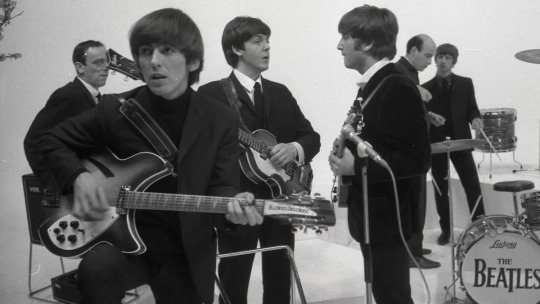
George Harrison with his Rickenbacker 360/12 on the set of the Beatles’ 1964 film, 'A Hard Day’s Night.' L-R: Actor John Junkin, Harrison, Paul McCartney, John Lennon, director Richard Lester and Ringo Starr. (Image credit: MAX SCHELER/K & K/REDFERNS/GETTY IMAGES )
#the beatles#george harrison#paul mccartney#ringo starr#john lennon#a hard day's night#richard lester
99 notes
·
View notes
Note
Wandering albatross (Diomedea exulans)

if doodle requests are still open… a Joe Hills for the soul?

tumblr sexyman
274 notes
·
View notes
Text
Happy Birthday, Rick Wright! (July 28, 1943)
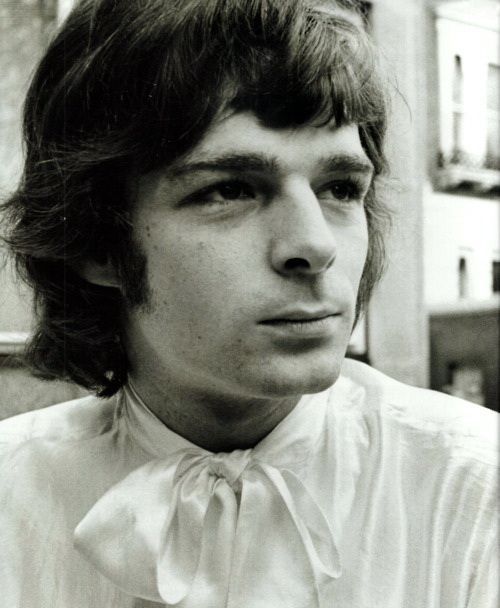
"Rick was so incredibly shy that he hardly spoke." - Clive Metcalfe
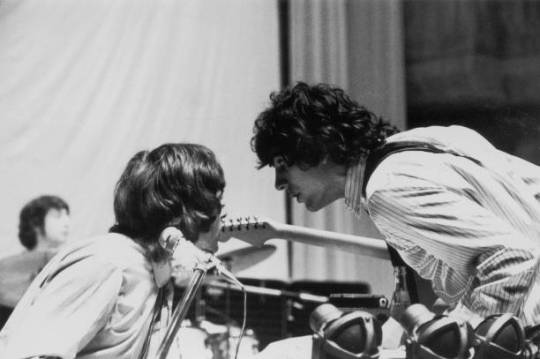
"I remember Rick sorting out the harmonies and telling everyone what to sing. I think everyone, including me, underestimated Rick. It's the classic management thing: he wasn’t any trouble, so you tended not to notice him." - Peter Jenner
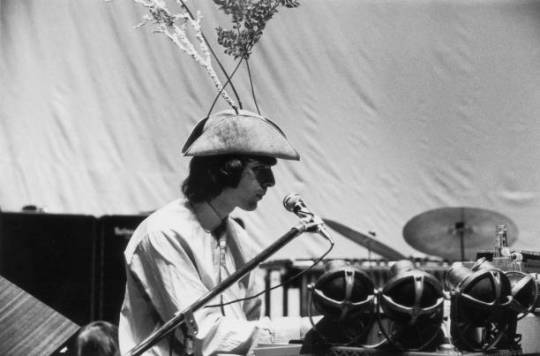
"A lovely chap, but a bit away with the fairies." - a former Floyd roadie
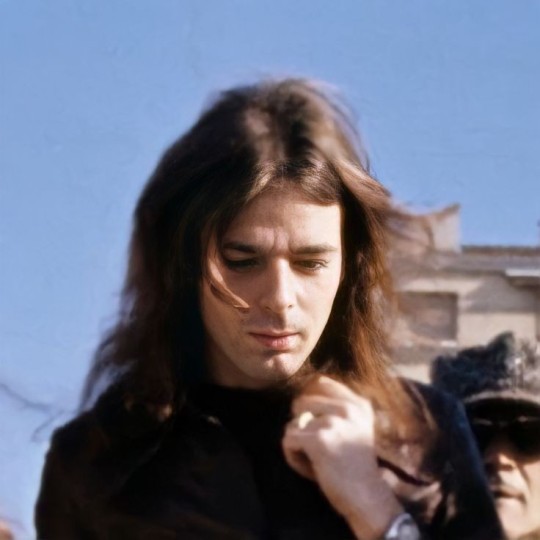
"Rick was a very shy and quiet guy. He was extremely beautiful, gentle and talented." - Jill Furmanovsky
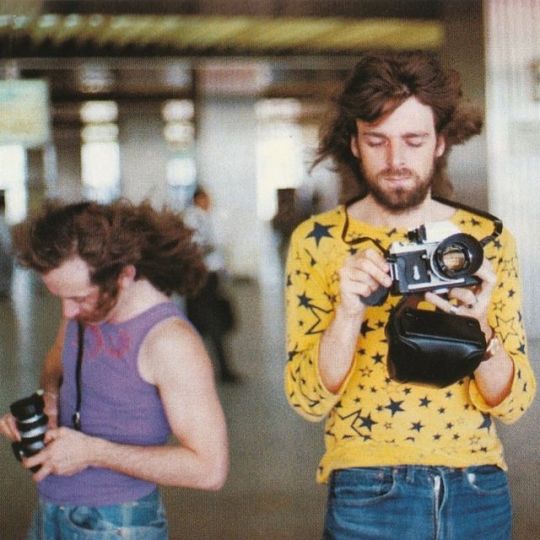
"He was by far the quietest of the band. And probably harder to get to know than the rest of us." - Nick Mason
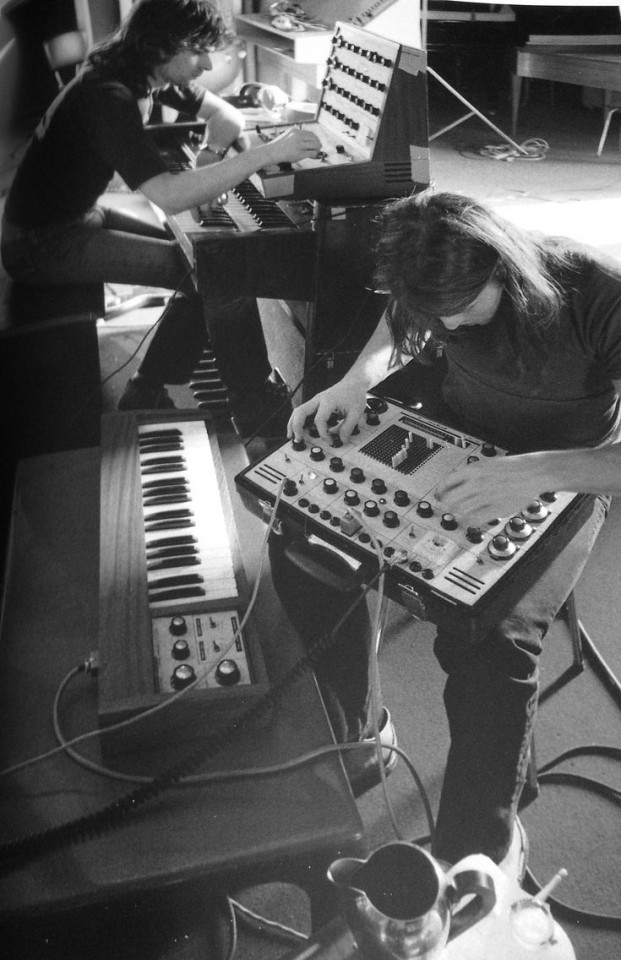
"There is this image of Rick sat working something out on the keyboards while a war went on around him between the rest of us." - Nick Mason
"Rick would sit at the back and not say anything for days, but his playing was the highlight of any session." - John Leckie

"It's almost that George Harrison thing. You sort of forget that they did a lot more than perhaps they're given credit for. Like George, Rick wrote, he sang, he did a lot of things, but he did become eclipsed by everyone else." - Nick Mason
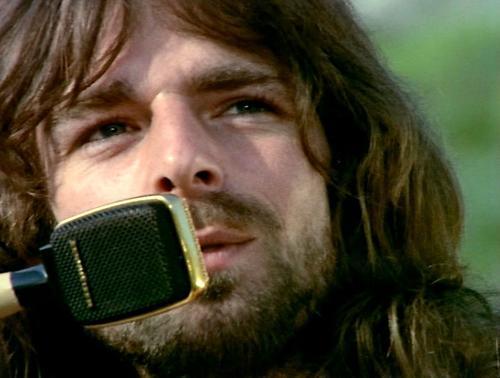
"The blend of Rick's and my voices and our musical telepathy reached their first major flowering in 1971 on Echoes. All the greatest Pink Floyd moments are the ones where he is in full flow." - David Gilmour
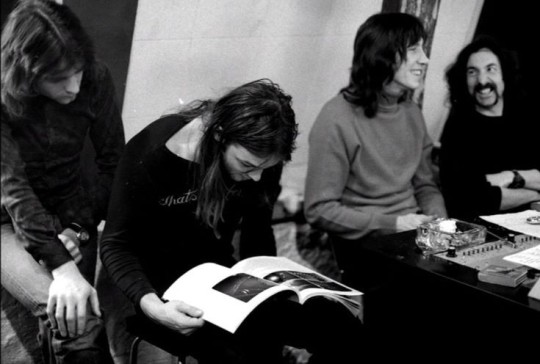
"Rick's got his character flaws. He can be a bit of a grumbler, but we get on. Rick's got soul. A real soul - a complete relationship with his playing." - David Gilmour
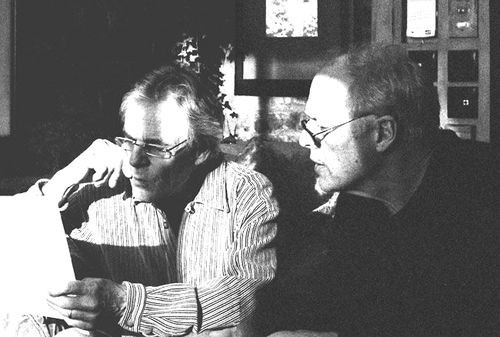
"We didn’t spend our time being close, but we had a musical telepathy and, at its best, we knew exactly what the other was going to do and could bounce off each other. Rick had his moments of being rather down about various things, and towards what was the end of his life – none of us knew that at the time – he came on board to do my On An Island tour and had the time of his life.
We’d get to a certain moment in the set where I was introducing people, and Polly would shout [French accent] “Reee-shard! Reee-shard!” And then people in the audience who’d been there the night before noticed and started shouting it too, and it grew and grew every show, and he visibly puffed up with joy! I really think that helped boost his confidence and he started playing more effusively. We just felt he should be fêted a little, as he was so retiring and tended to be in the background, and I’m up the front there and I’m, you know, big and strong. So he had the time of his life and really loved it and was playing brilliantly." - David Gilmour
And some quotes from the man himself:
"We have great understanding and tolerance of each other. But there are a lot of things left unsaid. I feel. Sometimes." (1972)
"I'm not technically a great pianist. I was saying to someone the other day that I wish I could play honky-tonk piano. I listen to Dr John and appreciate what he does, but then can he play the Hammond like I can? I look at myself as more of a writer than an actual performer. I can't play the piano fast - I'm no Oscar Peterson - and I can't read music. Sometimes, I wish I could sit down and play a wonderful piano concerto." (1996)
"I wasn’t close to David when he joined but I am now. He may not feel that, but it’s what I feel!" (2007)
Q: Who wrote Echoes?
Rick: Me?!
25 notes
·
View notes
Text
The Beatles’ ‘Now and Then’: A Glimpse of Greatness
The “Last” song with contributions from all four Beatles, made possible by new technology, finds its power in vulnerability and nostalgia. From left: Paul McCartney, John Lennon, George Harrison and Ringo Starr. “Now and Then” is billed as the band’s “last” song. Credit…Getty Images “Now and Then,” released on Thursday, is billed by its label, Apple Corps, as “the last Beatles song.” It’s a…

View On WordPress
0 notes
Text
Credits and Information
If you would like to contribute please reply to this post. All contributions will be credited below.
Credits
1. Katherine Yarrow
2. Daryl Gillam
3. Andy Simms
4. Tom Cook
5. Winsy
6. Grace’s
7. Billy Bog Weed
8. Winsy
9. Steetley Dan
10. Muse : The 2nd Law: Isolated System
11. Winsy
12. Jez Lowe : Wagga Moon
13. Edward Clarke
14. Grace’s
15. Winsy
16. Michael Holt / John Dawson
17. Ridley & Tony Scott : Boy & Bicycle
18. Yorkshire Film Archive
19. Winsy
20. Tube Alloys
21. “If I tell you I’ll have to kill you” 🤷♂️
22. Maxy Neil Bianco : Pig The Dog
23. Seaton Snooks Tea Room : Twitter @seatonsnookstea
24. PJandOddam
25. History of Hartlepool in Images
26. 500 Club
27. History of Hartlepool in Images
28. Winsy
29. Stuart Drummond
30. Simone Jones Higgins
31. Grace’s
32. Unknown
33. Institute of Civil Engineers
34. Pete Cholmondeley
35. History of Hartlepool in Images
36. History of Hartlepool in Images
37. Harry Harland
38. Mike O’Hare
39. The Lake Poets : Shipyards
40. The Northern Echo
41. Jeff Stelling / Hartlepool United TV
42. Northern Daily Mail
43. Winsy
44. Katherine Yarrow
45. History of Hartlepool in Images
46. The Fettlers : The Hartlepool Monkey
47. Peter Vicente
48. Chris Downey
49. Winsy
50. Katherine Yarrow
51. www.Seatonsnook.com
52. Anth Frain
53. Our Newcastle
54. Winsy
55. History of Hartlepool in Images
56. Dave Harrison/HOHII
57. Peter Vicente
58. History of Hartlepool in Images
59. History of Hartlepool in Images
60. Maxy Neil Bianco : Can House
61. Katherine Yarrow
62. History of Hartlepool In Images
63. Winsy
64. Carl Richardson
65. DNR Zero
66. Peter Vicente
67. The Naughty Boys
68. Katherine Yarrow
69. Harry Proctor
70. Winsy
71. Jez Lowe
72. Jan Proctor
73. Boothby Graffoe
74. Harry Proctor
75. Teesside Development Corporation
76. The Skapones
77. Caroline Brown
78. Tony Readman
79. Reg Smyth : Andy Capp & Flo
80. Phil Reay
81. Bob Fox
82. Comrade Ramirez McHaggis
83. Debbie Carter
84. Hartlepool Fash Watch
85. Peter Vicente
86. Uncle George
87. Northern Daily Mail/Press Association
88. Town Of Hartlepool Challenge [THREAD CLOSED BY ORDER OF DPRK!]
89. Maxy Neil Bianco
90. Winsy
91. Dave Spencer
92. Jan Proctor
93. BBC News
94. Wildcats of Middleton
95. Winsy
96. Maxy Neil Bianco
97. Winsy
98. Harry Blackwood
99. The Woven Project : Quiet Girl
100. Phil Reay / Balotelli
101. Brian Clough
102. Graeme Oxby / Angel Brothers
103. Lewis Longwill
104. Strava
105. Paul Davis
106. The Young ‘uns : Cable Street
107. The Other Record Shop
108. 883 Postal and Courier Squadron, Hartlepool TA Centre
109. David Icke
110. Classified. D-Notice
111. NHS Darlington, Durham Dales PCT @ Henson Close & Darlington Borough Council Joint Commissioning Team on behalf of Easington PCT
112. Winsy & Coalfields Regeneration Trust
113. Only Fans
114. Average Joe’s
2 notes
·
View notes
Text
Some radio for ya
Listen to these radio shows, will you? Put them on to soundtrack whatever it is you get up to on here. Your GIFs will thank you.
Heathen Disco #281 (happy V-Day ya fucks)
https://www.mixcloud.com/mosurock/heathen-disco-show-281-13-february-2022/
HOUR 1
Gabor Szabo – Somewhere I Belong
Atlantis – Mr. Bigshot (You Get the Credit)
Margo Guryan – Someone I Know
Air – Baby I Don’t Know Where Love
Betty Davis – Anti Love Song
Modern Nature – Masque
DJ Python – Angel
Bardo Pond – Tommy Gun Angel
Moose – Boy
My Dad is Dead – In Your Mind
The Reds, Pinks and Purples – Tell Me What’s Real
Cate Le Bon – Cry Me Old Trouble
Patrice Rushen – Haven’t You Heard
Pete Yellin – It’s the Right Thing
Print Head – Dying the Way You Want
HOUR 2
Mdou Moctar – Tala Tannam
The Mountain Movers – I Watch the Sea
Levande Död – Unter Rotvältan
The Jesus and Mary Chain – Upside Down
The Chamber Strings – Telegram
Honey Radar – Sunrise Alphabet
J.R. Bohannon – Plum Village
The Main Ingredient – Work to Do
Dalibor Cruz – 02
Norma Tanega – You’re Dead
Vulcan – Lightning
Atomic Rooster – Lost in Space
Jake Xerxes Fussell – Washington
Banchee – “38”
HOUR 3
Konono No. 1 – Masikulu
Alleged Witches – Dukun
Sheila E. – The Glamorous Life
A;GRUMh… – nGUU (Petite Fugue)
Front 242 – Don’t Crash
Ava Mendoza – Apart From
Self Improvement – Firestarter
Link Wray – Beans and Fatback / I’m So Glad
Heavenly Bodies – Universal Resurrection
Cafe Racer – Pretty Trash
Heathen Disco #280 (Tribute to the late Jerry Weber / Jerry's Records in Pittsburgh, an important place in my history)
https://www.mixcloud.com/mosurock/heathen-disco-show-280-30-january-2022-rip-jerry-weber/
HOUR 1
The Dream Syndicate – The Days of Wine and Roses
Trees – Tom of Bedlam (live)
Jimmie Rodgers – Jimmie’s Texas Blues
Ronnie Lane and Slim Chance – Bye and Bye (Gonna See the King)
Wire – Blessed State
Matt Jencik – Yes Pussyfooting
T. Rex – Metal Guru
The Rolling Stones – Rocks Off
The Comsat Angels – Independence Day
The Soundcarriers – At the Time
Little Sister – You’re the One (Part II)
Ava Mendoza – Sun Gun
Marsha Hunt – (Oh No! Not) The Beast Day
HOUR 2
Cardboards – Electrical Generator
John Cale & Terry Riley – Church of Anthrax
Cabaret Voltaire – Protection
The Embarrassment – Celebrity Art Party
Bad Brains – Joshua’s Song / Banned in D.C.
My Bloody Valentine – I Can See It (But I Can’t Feel It)
John Dwyer, Ryan Sawyer, Greg Coates, Wilder Zoby and Andres Rentaria – Yuggoth Travel Agency
BÖRN - Þú Hvíslar
The Pheromoans – S.B.’s / Greece Theme
The Fall – Gramme Friday
Balaclavas – Roman Holiday
Master’s Apprentices – Easy to Lie
DJ Harrison – City Lights
The Poppy Family – Happy Island
HOUR 3
Darryl Way’s Wolf – Game of X
Butthole Surfers – Jimi
Spacemen 3 – Lord, Can You Hear Me
Hollow Frames – The Forest Reveals Itself
Sly & the Revolutionaries – Sensi Dub
Public Image Limited – Solitaire
Hard Corps – Desolation Land
David Bowie – She Shook Me Cold
Sic Alps – Message from the Law
Mathematiques Modernes – Disco Rough (Long Version)
The Impossible Dreamers – Spin
Talk Talk – New Grass
4 notes
·
View notes
Note
They dealt with all of the above. Ringo was treated as a joke for pretty much everything, especially since this was the era of prog rock. His personal life was also tabloid fodder. George was derided as being a dour spiritual nut who was out of touch. He along w/ Ringo didn't get the respect he deserved as a guitarist bc his style wasn't in at the time & people knew little about his role in The Beatles. All credit went to Lennon/McCartney. 1/2
John had the benefit of having the rebel genius image, but even he became a source of ridicule with all the stunts he pulled with Yoko and the way his career declined after Imagine. He wasn't deified to the degree he was in the 80s. I'm not trying to say Paul never had a hard time, but the way this fandom talks as if he is the only one who faced extreme criticism or disrespect just tells me they haven't looked much into the other Beatles' lives. The man is more admired than most musicians. 2/2
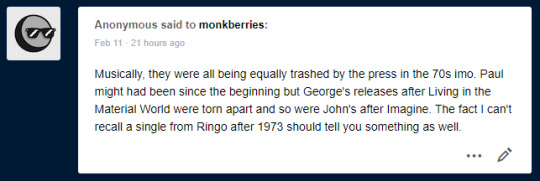
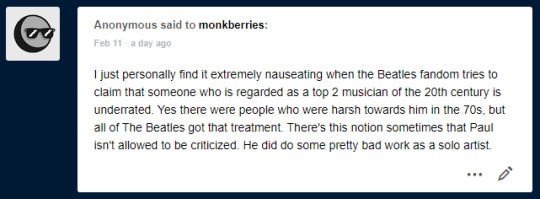
(IDK if this screenshotted anons were from the same person or not, but I’ll just answer them in this one since it’s all the same subject.)
Here’s what I think is valid, as I see it: Paul fans are upset by the way his music was treated by the music press, especially in the first few years of the 70s, while the music of the other three were generally given at least the benefit of the doubt. They’re not upset about the tabloid gossip, the purely personal stuff – they are upset, specifically and with good reason, at the way Paul’s music was treated and the way the music world’s personal dislike of him seeped into their music reviews. I’m gonna focus in on 1970 through the end of 1974, since this is where a lot of the complaints spawn from, and things start to shift in a big way in 74. You didn’t ask but contemporary writings about their early solo music is something I’m fascinated by anyway and you turned the wind-up toy key in my back, so. Off I go. This is gonna be so, so long.
At different points in the decade, all of them were subject to a sullying of their personal reputations. That is where I do agree with you: all of them were subjected to that by the press, to varying degrees, at varying times, and for various reasons for each of them. That is just what happens to public figures the longer they are public figures. Tabloids mess with everyone no matter how beloved they are.
However, that’s not what I generally see Paul fans getting upset about. What I see is that they’re upset at the way the much more legitimate and widely respected music press approached Paul’s music and talent in general. It is widely received knowledge now that the critics treated Paul’s music differently than they did John’s and George’s and even Ringo’s; the trashing was not “equal.” They came at John and George with the assumption that their talent was real and ongoing outside of the Beatles, their genius unquestionable, their motives pure and well-intentioned and honest. Paul was not afforded these assumptions. Some examples to show what I mean, most of them found through wikipedia, rocksbackpages, or rollingstone.com.
John
Plastic Ono Band was Robert Christgau’s number one album of 1970 in The Village Voice. from Creem’s review: “John's record, of course, has been righteously raved over ever since its release, justifiably. It's interesting and even enlightening to see a man working out his trauma on black plastic but more than that, it's totally enthralling to see that Lennon has once again unified, to some degree, his life and his music into a truly whole statement.” From High Fidelity’s review: "a tremendously exciting listening experience, perhaps the best any Beatle has ever offered." In their Imagine review, Rolling Stone called POB “perfect.” A couple reviews in the mainstream were more mixed, put off a little by the rawness of it, but overall the rock world quickly grew to see this album as a work of genius.
Imagine was even more widely well-reviewed, despite a mixed review from Rolling Stone (John fell out with Jann Wenner around this time, curiously). Here’s a passage from rateyourmusic.com: “Imagine was actually one of the most critically acclaimed albums of the year, aside from this tepid review in Rolling Stone. Indeed, much of the rock press seemed palpably relieved that the former Beatle hadn't gone completely off the deep end. ‘It's the best album of the year, and for me it's the best album he's done, with anything, or with anyone, at any time,’ Roy Hollingworth wrote in the 10/9/71 issue of Melody Maker. ‘The album is superb,’ Alan Smith agreed in the 9/11/71 issue of NME. ‘Beautiful. One step away from the chill of his recent total self-revelation, and yet a giant leap towards commerciality without compromise...I have no criticism at all.’”
Some Time in New York City was admittedly John’s nadir, and the press was vicious about it, both personally and musically, deeming the album egotistical, lacking in energy, and devoid of sincerity. However, many maintained a reverence for the genius that came before it and hopeful encouragement for the future. Rolling Stone said that “The Lennons should be commended for their daring;” Creem said it wasn’t half bad; and even though NME’s article was scathing, it ended with a plea for John to return to form, saying, “Don't rely on cant and rigidity. Don't alienate. Stimulate. You know, like you used to.”
Mind Games, though reviews were mixed, fared far better in comparison. Again, there is a hopeful tone to the reviews, a sureness that John can do better. From Rolling Stone talks about the music being a return to POB form, but the writing is his worst yet; however, Landau qualifies this by saying the lyrics aren’t “offensive, per se, just misguided... [John Lennon’s admirers] might even be able to withstand something more challenging” and then praises John’s voice, his production, and a few individual songs. In Melody Maker, Ray Coleman says, “if you warm to the rasping voice of Lennon and, like me, regard him as the true fulcrum of much of what came from his old group, then like any new Lennon album, it will be enjoyable and even important.” Christgau is more middling but also says, “Still, the single works, and let's hope he keeps right on stepping.”
Walls and Bridges seems confusing to reviewers in retrospect. They couldn’t seem to come to a consensus on it. The musicianship was widely praised, for the most part, though Rolling Stone criticized the first side on this front; reviewers alternately said it was “the latest chapter in John Lennon’s Identity Crisis” (Creem) and “truly a superb album by any standards” (Melody Maker). Throughout the Rolling Stone review, the author is able to thoroughly critique the songs, for better or worse, with a neutral affect and without resorting to insulting John personally. He ends the review on a positive note: “When one accepts one’s childhood, one’s parenthood and the impermanence which lies between, one can begin to slog along. When John slogs, he makes progress.” Again, even though the reviews aren’t all positive, we can see, especially and most importantly in the most influential rock magazine of the time, the acknowledgment of his talent, a sense of excitement for what John will do next, and a belief that his work is authentic and honest.
George
All Things Must Pass, I mean. Apart from a couple of outliers like Christgau in The Village Voice (he called it “overblown fatuity”), it was incredibly, almost universally beloved by the music press when it came out. There was quite a bit of surprise that such a talent had been under everyone’s noses all this time, but I don’t think anon is quite correct that all the credit for the Beatles went to Lennon/McCartney. For example, Ben Gerson in Rolling Stone recognized George’s talent within the Beatles like this: “Up until now, George has been perhaps the premier studio musician among rock band guitarists. From the electronic whine which began “I Feel Fine” to the break in “Hard Day’s Night” to the crazed, sitar-influenced burst on “Taxman,” George exhibited an avant-garde imagination and a technical flawlessness, as well as the ability to stay within the bounds of a song, which has remained unparalleled.” In Melody Maker, the feeling of journalists was summed up thusly: hearing the album was “the rock equivalent of the shock felt by pre-war moviegoers when Garbo first opened her mouth in a talkie: Garbo talks! – Harrison is free!" The personal nature and honesty of the lyrics were praised as well; Time described it as an “expressive, classically executed personal statement.” Ben Gerson did call his proselytizing offensive, but in the next sentence says that George redeems himself from that with the personal plea in Hear Me Lord.
Concert for Bangla Desh - again, some cynicism from Christgau in The Village Voice (must have woke up on the wrong side of the bed that day) and of course tax issues dogged it later, but overall, for the rock press at the time, this was a crowning achievement that George pulled off. He was praised all over the press, countercultural and mainstream, for his live musical talent, the group of musicians that joined him, the lack of political motivation, the sincerity and goodwill, and George’s ability to bring back "a brief incandescent revival of all that was best about the Sixties" (Rolling Stone). To this day he is credited with creating the model for future charity concerts.
Living in the Material World - Nothing could have topped the one-two punch of ATMP and the Concert for Bangla Desh, but honestly, LITMW came pretty close for some journalists. Rolling Stone again praised George’s honesty and authenticity: “ Despite the occasional use of “psychedelic puns,” Harrison’s lyrics are so guileless they convey an extraordinary sincerity that transcends questions of craftsmanship. Similarly, the devotions we are called upon to share with Harrison, though they communicate no specific, private torment, do have the authenticity of overheard prayers and are therefore sacred.” Melody Maker said, "Harrison has always struck me before as simply a writer of very classy pop songs; now he stands as something more than an entertainer. Now he's being honest." The pushback against his pious attitude and lyrics picked up some steam with this album, particularly with Christgau (again) and Tony Tyler of NME, who called it “so damn holy I could scream.” However, it was far from the consensus opinion at the time, and with the biggest rock magazine in the world at your back, you can withstand quite a bit.
Dark Horse, oof. That poor man. It did get some positivity in Billboard and Melody Maker, but my god, the reviews for this album and its subsequent tour were so cruel. I suspect when these anon(s) talk about the others being treated terribly by the press as well, this, along with John’s STINYC, is one of the examples they would give, and they’re not wrong about that. This was the point where George’s piety and what they perceived as a sanctimonious attitude finally started really getting to everyone, and the album plus the tour was the perfect opportunity to dogpile on him. I guess it was to be expected; no one can ride that high forever, and the press loves to knock people over and kick them while they’re down. Rolling Stone called it “disastrous,” “shoddy,” and called his guitar work “rudimentary,” eventually declaring that George had “never been a great artist.” This from the same magazine that was practically worshipping at his feet the year before. Yowch.
Ringo
Sentimental Journey - The less that’s said about this album, the better.
Beaucoups of Blues was actually quite well-received. No one called him a genius for it, and it wasn’t a serious personal record and therefore wasn’t treated that way, but journalists seemed uniquely able to let themselves enjoy this record despite the serious/political/personal tone of most musicians at the time. Melody Maker believed Ringo had "conviction and charm" and that because of that, the album stripped away the serious “hip posturing” and let you just enjoy the music on its own terms. The Village Voice said that Ringo was “good at making himself felt.” Although Rolling Stone’s tone was a bit more cruel than other magazines (there was a crack somewhere in there that Ringo wasn’t as smart as John), it also called him lovable and the record “a real winner” where the songs “sound terrific.”
Ringo was a total smash and I think people forget this. It’s remembered only because it’s an album that was worked on by all four Beatles, but actually, the critics fuckin loved it. Ringo was praised in Rolling Stone for his unpretentiousness, sensibility, and essentially collaborative nature: “Ringo was always the figure of conciliation within the Beatles, undoubtedly the most genial, conceivably the most sensible, and the one with the smallest musical axe to grind. His very lapses bespoke the esteem in which the others held him; had they not liked him so much, those perfectionists would never have allowed him to sing. Perhaps because as the drummer he stood outside the process of creation, he had the best perspective from which to see the Beatles as a unity. Ringo has never had any pretense of self-sufficiency. Once he had gotten his special projects out of the way (projects for which John, Paul and George's talents would have been unsuited anyway) Ringo was ready to call upon the three most obvious people to assist him with writing, singing and playing. As Starr's first "pop album," Ringo signifies a homecoming, not just of family, but in musical style as well.”
Goodnight Vienna was kind of a minor album for Ringo, but still, reviews were pretty good. Rolling Stone praised his “unalloyed sincerity which is his trademark and trump card.” Yet again, we see the theme of authenticity popping up in these reviews - if you are perceived as authentic, honest, and sincere, that takes you a long way with music reviewers in this time period, and Ringo was nothing if not wholly, completely himself.
Paul
McCartney - One of the main complaints of Paul fans is that Jann Wenner forced Langdon Winner, the author of the review for this album in Rolling Stone, to rewrite his article and put a more negative spin on it. The result is that Winner praised most of the music but totally undermined his own praise by questioning the authenticity of the tone and deriding the press release that came with the album as much as he praised the music. He ends the article like this: “I like McCartney very much. But I remember that the people of Troy also liked that wooden horse they wheeled through their gates until they discovered that it was hollow inside and full of hostile warriors.” This was a huge blow at a time when personal authenticity and substance were considered paramount. Melody Maker also questioned the legitimacy of his genius, saying “With this record, [McCartney's] debt to George Martin becomes increasingly clear.” Most other reviews weren’t any better.
Ram, I mean, Jesus Christ the reviews for this. It’s a widely respected album now, even made the RS top 500 albums of all time list last year, but at the time people were still so angry with Paul for supposedly breaking up the Beatles that they were still taking it out on his music a year later (imo). Landau in Rolling Stone called it “emotionally vacuous” and said it lacked conviction, saying also that it was “so incredibly inconsequential and so monumentally irrelevant you can’t even [hate it]; it is difficult to concentrate on, let alone dislike or even hate.” NME called it “the worst thing Paul McCartney has ever done.” Threaded through these reviews is a belief that the songs are devoid of meaning and that Paul’s happy domestic front is just a frustrating lie; Christgau in The Village Voice said he was “infuriated by the McCartneys' modern young-marrieds image” - infuriated because he clearly doesn’t believe it, rendering Paul dishonest and his music inauthentic. Once again journalists are unable to review Paul’s music without sniping about him as a person.
Wild Life - Though the situation remains largely the same - reviewers refuse to take him seriously, believe anything he says, or treat his musical talent as anything but vacuous fluff - the reviews aren’t quite as bad as they were for Ram and a bit of positivity begins to stir. It’s evident especially in the Rolling Stone review, where Mendelsohn wonders if Paul is making crappy fluff on purpose to piss John off because it will sell just as well anyway. It’s not much, and on top of the fairly strong criticism there is almost no hope for future Paul releases: “My own conviction is that we'd be foolish to expect anything much more earth-shaking than Wild Life out of McCartney for a good long while... In the meantime the reader is advised to either develop a fondness for vacuous but unpretentious pop music or look elsewhere for musical pleasure.” But it’s something.
Red Rose Speedway Paul continues to be lambasted by a lot of the press on this album for being lightweight and having no meaning behind his songs (at this point it’s just repetitive to quote the articles, just trust me that they say basically the same thing they were saying for the past three albums too), BUT I think a nuance that gets forgotten in all of this is that Rolling Stone gave it kind of a decent review. It seems like they finally quit gatekeeping and realized that songs don’t need to have some deep personal meaning to be good. Kaye is still not very nice about Paul’s lyrics but he recognizes that he doesn’t have to take Paul’s music on the same terms as he takes John and George. Paul’s music is less personal, but that doesn’t make it unworthy. He calls it “pleasant, accessible without concentration” and praises Paul’s voice and arranging skills. It feels like for this album, Rolling Stone took the stick out of its own ass when it came to Paul and finally relaxed enough to receive Paul’s music on his terms rather than theirs. Which, imo, primed the rock world for...
Band on the Run, Paul’s comeback. Even though Christgau in The Village Voice remained unconvinced (he called it “a pleasant piece of hackwork”), almost everyone else adored it. It seems weird to us now, but the general sentiment seemed to be that people were surprised by how good this album was. NME said, “The ex-Beatle least likely to re-establish his credibility and lead the field has pulled it off with a positive master-stroke”; and although Landau’s review in Rolling Stone overflowed with praise, he also said, “I'm surprised I like Band on the Run so much more than McCartney's other solo albums because, superficially, it doesn't seem so different from them.”
I hope I’ve been able to demonstrate a general trajectory with the musical reputation of each Beatle here. John starts off on two incredible high points, crashes and burns, and then works his way back up. He DEFINITELY missed with STINYC, but even when he followed it up with Mind Games, there was still a hopeful tone to the reviews, sort of like, “Ah, well, the last two weren’t great but we’re still looking forward to what John will give us next.” Until the Dark Horse tour/album, which did sour the press on poor George, the music press adored him. It was hit after hit with him. He could not miss. Three high points, one after the other, then a monumental crash. Ringo seems to stay fairly high, even if the records aren’t serious records. All three of them start out incredibly well, and the music press was able and willing to give them the benefit of the doubt.
Paul was given none of that. Perhaps because he was out of step with the attitudes about music at the time, perhaps because journalists hated him for breaking up the Beatles, perhaps because they believed John when he painted Paul as “establishment,” perhaps a combination - whatever their issue was, Paul was given no benefit of the doubt to start with, no faith in his genius, and no belief in his authenticity. He was just a hack to the music press for the first few years of the 70s; he started at the bottom and was forced to work his way up, unlike the other three. It started, imo, when Wenner forced the journalist who wrote the McCartney review in RS to rewrite the article, and it spiraled from there. He was seen as hollow and uncool, as one of the anons said, “straight” in the parlance of the time - straight meaning “establishment.” This is kind of where I do start to roll my eyes a little bit at stans, when they get upset at people calling him “establishment” and trying to prove that actually he was so anti-establishment that people couldn’t handle it or whatever, without trying to understand what the word “anti-establishment” meant at the time. But there are also really substantive arguments you can make that say Paul’s music was not taken seriously because of a personal grudge against him.
I’m not saying that all of them didn’t have run-ins with the music press. I’m saying there is nuance here that I don’t think these anons are allowing for in the first few years of that decade. They came at George and John and Ringo with a positive, or at least neutral, slant most of the time. They came at Paul with a negative one. Case in point are the reviews of Band on the Run that were surprised at how good it was. That stuff gets people’s hackles up. The others didn’t have positive reviews rewritten to be more negative. The others didn’t have albums savaged that are now on the Rolling Stone top 500 albums of all time list. I do agree that John, at least, and George post Dark Horse, had a harder time with the music press than people generally remember or care to think about – deification is retroactive, I guess, and as Paul fans we should definitely recognize that Paul wasn’t the only one who went through a rough time with the press. But I do think Paul’s situation was made uniquely and unjustifiably difficult for those first few years.
I mean, at the same time, I cannot stress enough how much this did not affect his bottom line. Despite the horrible reviews, Ram still made a ton of money, McCartney made a ton of money, Band on the Run and Wild Life and Red Rose Speedway all made a ton of money. He had a fanbase, a huge one, that followed him loyally and faithfully through the early 70s as he was getting savaged by the press, and through the middle and late 70s when he was touring. At some point, you have to step back and go, wait. Why does any of this matter? This was 50 years ago. He was a multi-millionaire then and is a billionaire now. And you are right; whenever people over-generalize and try to make the case that Paul was always badly reviewed and the others were press darlings, I tend to get annoyed because they’re totally missing the actually interesting nuances of the situation (that can be easily found online! I found most of the music reviews through snippets on Wikipedia!) In conclusion, I guess my point is that both “Paul was vilified while everyone else wasn’t” and “everyone was equally vilified” paint the events of the early 70s with brushes that are too broad and miss the nuance that was evident in the way the press interacted with their music.
#Anonymous#macca#johnny#geo#ritchie#fab four#sorry this isn't so much a response to anon's points as it is me going off on research tangents and accidentally writing a masters thesis#reading old rolling stone album reviews is such an unexpected pleasure i recommend it
34 notes
·
View notes
Text
HINTS OF MODERN POLITICS
As advertised, this posting presents a timeline of Whig Party accomplishments, developments, and policy proposals. Roughly the timeline begins in the 1820s but ideologically, the ideas of that party began with the Federalists, such as John Adams and Alexander Hamilton. This review, though, starts with the general political environment of the 1820s.
1824
By way of context, the party started as various members of the Democratic-Republican Party, inflated by former Federalists Party members – who drifted to Jefferson’s party as a result of the War of 1812 – felt uncomfortable with this alignment. A new thrust took place as that discomfort became more acute and an array of minor “parties” took hold in representing their political beliefs. For example, in 1824, John Quincy Adams and Henry Clay were National Republicans.
With that background, one can find the first organized efforts to attain the White House by these displaced politicians began in 1824. In the election of that year, there were four major candidates: nationalist Clay, Secretary of State Adams (whose father was the famous founding father and Federalist president), Secretary of the Treasury William H. Crawford (who while supporting re-chartering the national bank in 1811 was a champion of state sovereignty), and the war hero, Andrew Jackson.
Clearly against the national bank was Jackson. The pro national bank candidates were Clay and Adams. Of the four candidates, Jackson garnered the most votes but failed to get a majority in either the popular vote or the Electorate College vote. Per the Constitution, the election was forwarded to the House of Representatives where each state had/has one vote and chooses the winner among the three top vote getters of the general election.
Clay, since he was third and generally agreed with Adams’ major positions, threw his support to Adams and that proved to be sufficient to win the White House. Jackson claimed that that arrangement was the product of a “corrupt bargain” and almost immediately began his campaign to become president four years hence.
1825-1828
Shortly afterward, those misplaced Democratic-Republicans, under the leadership of Adams, Clay, and Daniel Webster organized themselves initially under the name, Adams’ Party. In opposition, Jackson, along with Crawford and John C. Calhoun, led in organizing the supporters of Jackson under the label of Jacksonians. Highly effective in this latter effort was the organizing role that the New Yorker, Martin Van Buren, played.
1828-1832
So effective was this other group that by 1828 they were able to defeat Adams’ attempt to win reelection by securing 56 percent of the vote. Shortly after, they organized permanently as the Democratic Party. But not all was going swimmingly under this new party’s leadership. During the years of his term, Jackson developed an animosity toward his vice president, Calhoun.
It seems Calhoun’s wife involved herself in derogatory talk against recently deceased Rachel, Jackson’s wife. As the next election day approached, Jackson did not choose Calhoun to be his running mate but instead chose Van Buren. Consequently, those who supported Adams and Clay felt that their fate was in good stead since the Democrats were hit with this split between Calhoun and the President.
1832-1833
Beyond the “wife” issue, Calhoun and Jackson disagreed over tariff policy and Calhoun’s backing of South Carolina’s nullification position.[1] He, Calhoun, resigned as vice president and entered the Senate in 1832. To remind the reader, the nullification issue came to a boil in the years 1832-1833 and is known as the Nullification Crisis in which South Carolina threatened to not abide by federal law. While a supporter of states’ rights, Jackson vehemently opposed this nullification position.
Clay proceeded to organize the National Republicans but was defeated in the 1832 election and Jackson achieved a second term. That election saw for the first time that each party held nominating conventions. But with the results of that election, the National Republicans would quickly thereafter fall apart as its members mostly evolved into the new Whig Party.
That newer party was the product of smaller Whig groups that opposed South Carolina’s nullification position but could not align themselves with Jackson. In short order, National Republicans, Anti-Mason adherents, and others formed a national Whig party. But while one can detect a “party” of sorts, it was not unified enough and decided to use a curious strategy for the next election in 1836.
In 1833, Clay set out to unite those who opposed Jackson and supported Clay’s “American System” policy positions. Those positions were made up of three foundational elements: advocacy for a sufficiently high tariff to protect and encourage American industry, support of a national bank to encourage business activities, and promotion of central government infusing money to advance infrastructure projects such as roads and canals throughout the nation.
These advocacies by Clay and his allies have been credited, by such historians as Michael Holt, with Whigs winning control of the Senate in 1833.[2] Through their efforts, they were able to shed the elitist image the National Republicans had. They also were able to make inroads into the South.
1833-1836
These nationally aligned politicians were mostly united in their opposition to Jackson but with not enough harmony to support one candidate. The challenge in 1836 was not facing the General – he was completing his second term – but instead his hand-picked successor, Martin Van Buren. As already alluded to, the Whigs ran various candidates and divided the anti-Jackson vote. Their plan was to deny Van Buren a majority of Electoral College votes and again win the White House as Adams had done in 1828, but that plan did not succeed, and Van Buren ascended to the presidency.
Adding to the Whig’s diverse base between its northern and southern supporters, there were other factors at play. There was the lost opportunity when former Jackson’s vice president, Calhoun, withheld his support to any anti-Jackson/Van Buren candidate who refused to adopt his nullification position. And the Whigs faced an improving economy under the Democrats and Jackson’s leadership. That proved to be enough to give Jackson the successor he wanted in Van Buren. Apparently, the Whigs still were not sufficiently united.
But then the national scene changed a great deal. And one sees what would become a recurring political storyline: “what the economy giveth, the economy can taketh away.” And it did not take long for the economy to face a sudden downturn. This blog will pick up that part of the story in the next posting by describing how the Panic of 1837 brought to a cessation Democratic rule as a results of the 1840 election.
1837-1840
But first, their defeat in 1836 convinced the Whigs that for 1840 they needed to be united. In addition, they had to generate a national policy platform and run a single standard-bearer. Among their ranks, they were able to elicit, beyond Clay and Webster, the support of many Anti-Masons such as William H. Seward and Thaddeus Stevens and disenchanted Democrats such as Willie P. Mangum, John Berrien, and John Tyler.[3]
And before leaving this general topic of uniting people under the Whig banner is the general antagonism to the Masons. It seems the concern there was that organization’s secrecy. Whigs were big on ending or highly curtailing secrecy in politics. Generally, they felt that such “behind the curtain” politicking was feeding a strong executive as exemplified by Jackson. The “American System” should include transparent governance and this business of secret protocols or hidden beliefs seemed to them as being un-American.
Along with this openness, Whigs got into conducting open rallies. Parades became common events as Whigs drummed up support around the country leading up to 1840. This furthered their attempts to give them a common touch and counteract the general impression that they were the party of the wealthy or of business interests.
The campaign ended, as will be further described in the next posting, with the election of William Henry Harrison and that effort is attributed with being the first presidential campaign to actively appeal to average Americans – a strong federalist move. A lasting campaign slogan in 1840 to which American school children are still taught from that election is “Tippecanoe and Tyler Too.”
It, Tippecanoe, refers to Harrison’s military victory in what would become the state of Indiana during the War of 1812. It reflects the Whigs’ understanding that for a party that represented the business interests of the country, it could only win a national election by proactively attracting those people’s votes that were not directly the targeted beneficiaries of their policies. A good bit of salesmanship enters the American political landscape and has been there ever since.
But all that would be incorporated in the election not of 1836 which featured Harrison as one of its leading candidates, but of 1840. Those moves went a long way in establishing the basic format of how national elections were to be conducted in the ensuing years up until today. While the Whigs experimented with this openness in 1836, it was a full-throated effort leading up to the 1840 victory.
[1] Calhoun provided a lot of the theory supporting the nullification argument.
[2] Michael F. Holt, The Rise and Fall of the American Whig Party: Jacksonian Politics and the Onset of the Civil War (Oxford University Press, 1999). For a critique of this book, one can look at a review by Allen C. Guelzo (“The Rise and Fall of the American Whig Party: Jacksonian Politics and the Onset of the Civil War by Michael Holt,” Journal of the Abraham Lincoln Association, 22, 2 (Summer 2004), 71-86)), accessed July, 23, 2021, https://quod.lib.umich.edu/j/jala/2629860.0022.206/--rise-and-fall-of-the-american-whig-party-jacksonian-politics?rgn=main;view=fulltext . In that review, Guelzo writes,
Howe reintroduced the Whigs, not as Eastern elitists bent upon wickedly obstructing the righteous class-leveling justice of Jackson/Roosevelt, but as the "sober, industrious, thrifty people," as the party of the American bourgeoisie, attracting the economic loyalty of small businesses and small commercial producers, and enlisting the political loyalty of those who aspired to transformation.
[3] Of course, this last politician will become president and prove not to maintain his support for Clay and the pro-national bank position of the Whigs.
#Whig Party#Democratic Party#Andrew Jackson#John C. Calhoun#Henry Clay#political parties#national bank#civics education#social studies
1 note
·
View note
Text
Why Do We Love…
Charlotte Martin
Our series "Why Do We Love..." published on each muse's birthday are getting to an end, and French former model and artist Charlotte Martin is next!
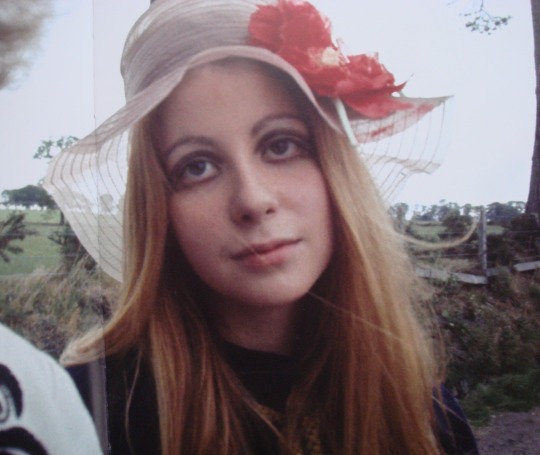
[Charlotte Martin in 1967 by Robert Whittaker. Sent to us by lovely Kana from Japan for our Family Zepp site, remember?]
We first new about Charlotte when one of us created a website called Family Zepp on piczo back in the day, remember that? We were teenagers and we loved Led Zeppelin, but unlike The Beatles, there weren't any sites for the girls or the children, so one of us started and we became familiar with the names of Maureen and Carmen Plant, Sabel Starr, Lori Mattix ... and Charlotte!
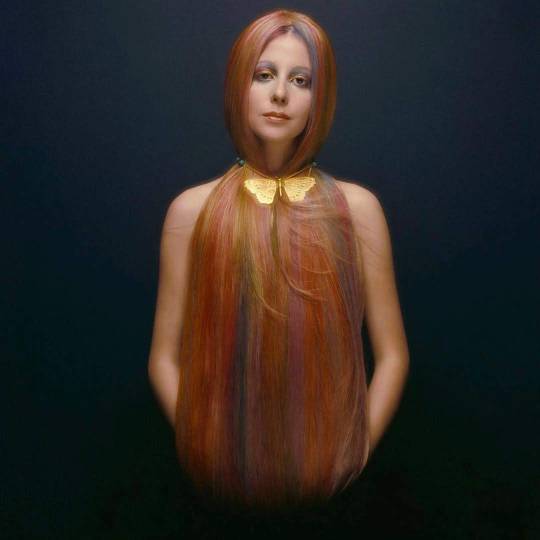
[Charlotte in 1969 by Barry Lategan]
Truth to be told, we had to do a real detective job with Charlotte, because it was said that she was a 1960s supermodel, but unlike Pattie Boyd, we couldn't find anything! And, like her, she had a relationship with Eric Clapton, before having one with Jimmy Page.
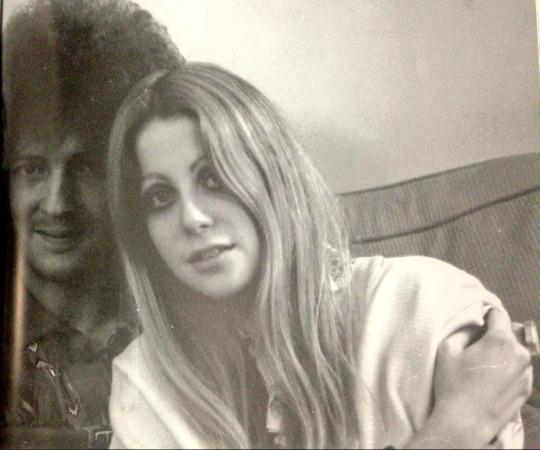
[Charlotte and Eric in 1967, by Robert Whittaker]
We also learnt that she had a short relationship with Beatle George Harrison, but never was included anywhere as a "Beatlegirl". Little by little we found (sometimes with a little help from our friends) more and more Charlotte information and photos, including modelling pics, but in every pic she looked different, so we weren't sure if it was her or not!
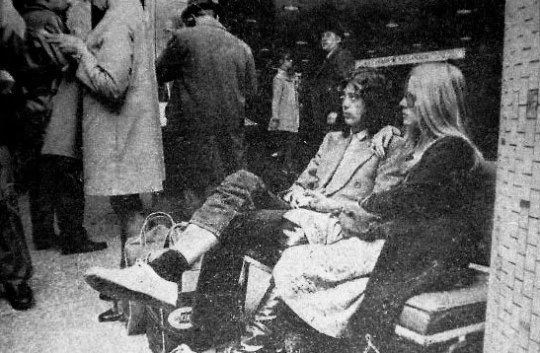

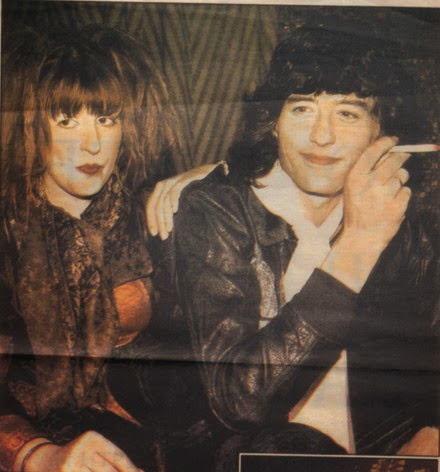
[For years these were the only Charlotte pics on the net we could find, early 1970s, late 1970s and 1980s...]
Little by little we learned she was on The Beatles "All You Need is Love" video or in Led Zeppelin's "The Song Remains the Same" film, so we took screencaps of her, to build our collection for the Family Zepp website!
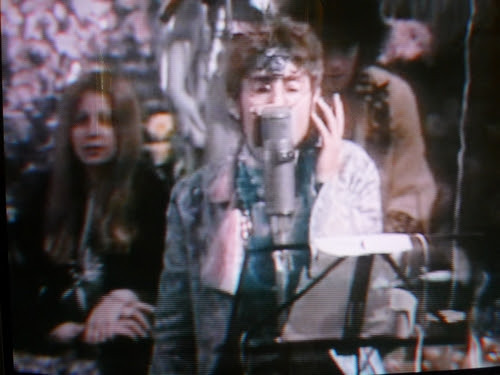
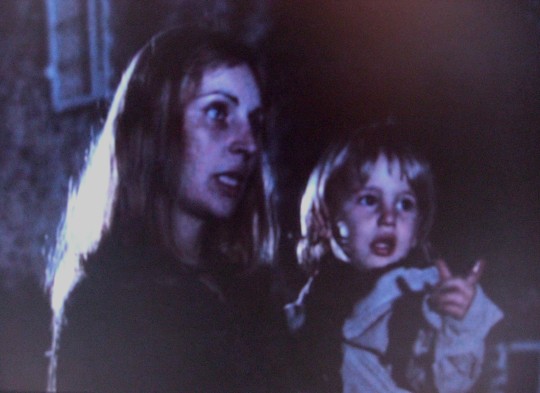
[Left, 1967 "All you need is Love", sitting between Paul McCartney -not shown- and John Lennon. Right, with her baby daughter Scarlet Page in a cameo in "The Song Remains the Same". Our caps]
But we think most of the photos we found came after, maybe thanks to tumblr and later (recently) instagram. We found amazing blogs like Liz Eggleston/Miss Peelpants who find the greatest and rarest Charlotte pics and share them with us all. So we could see Charlotte's beauty and talent once and for all!

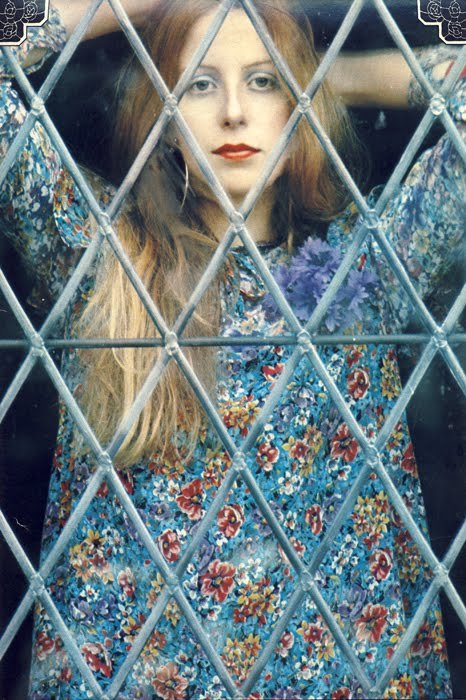
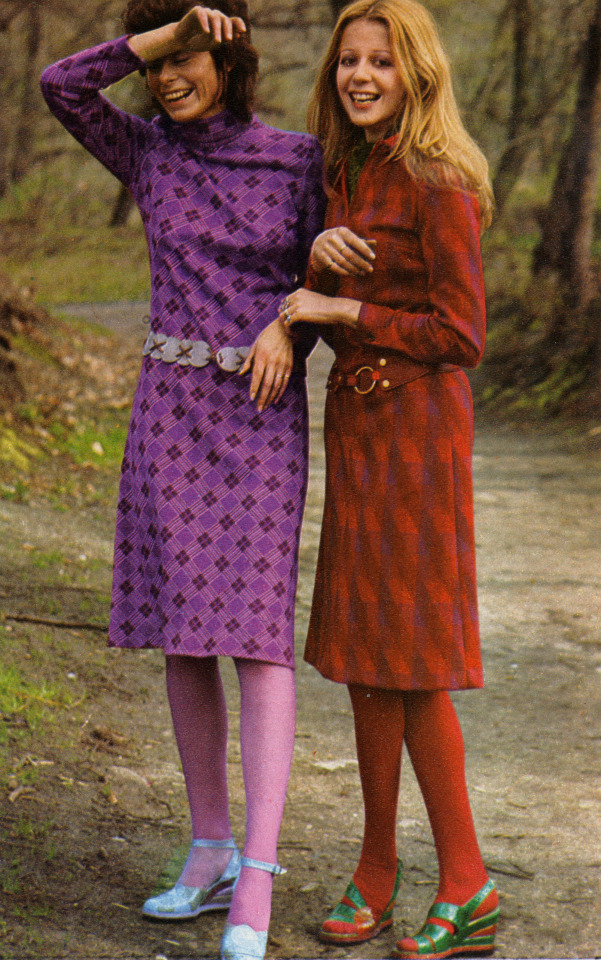
[Three of the numerous of modelling Charlotte scans that Liz Eggleston/Miss Peelpants shares in her blog, go and follow her!]
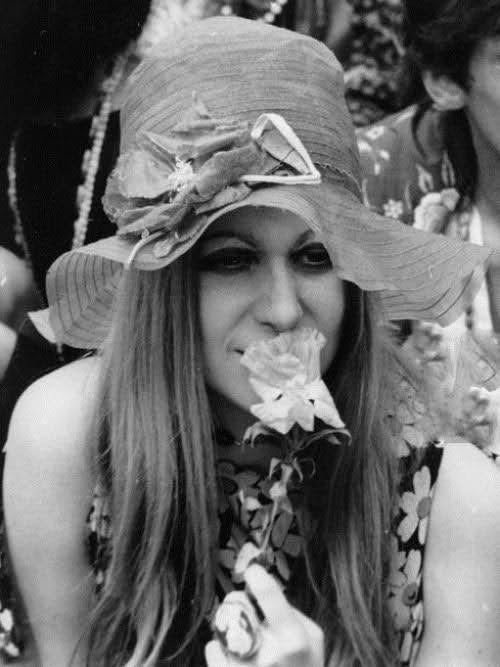
[One of the typical images of Charlotte... thanks to tumblr and instagram we could find out the date and occasion! The 1967 Legalize Cannabis Rally at London's Speaker's Corner]

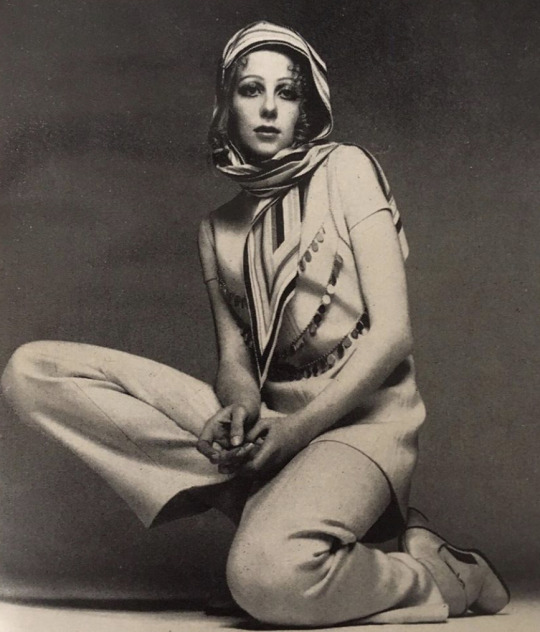
[Left, another Beatles' connection! Modelling The Fool for The Apple boutique in 1968. Right, Charlotte shared her 1969 modelling image on her instagram]
We respect Charlotte for never selling her stories of the times she spent with The Beatles, Eric, Jimmy Page and Led Zeppelin... even if we'd like to know all the details!

[Charlotte, Jimmy, and their daughter, photographer Scarlet, in a Scarlet photography exhibition in 2007. Charlotte is in good terms with both Eric and Jimmy.]
Nowadays she is a very successful artist and painter, and you can see her creating her work on her website or the numerous exhibits she's done.

[Charlotte in 2017 with one of her paintings, from her website]
Today, for her 75th birthday, we wanted to share with all of you, dear followers, how we knew about Charlotte and what made us love her.
Here we share:
OUR BIOGRAPHY OF HER, WITH LINKS TO AMAZING SITES
HER POSTS IN OUR BLOG
OUR PHOTO COLLECTION HOSTED AT GOOGLE PHOTOS (all the photos have been collected from the net, photographers, details, websites etc are credited when known)
HAPPY BIRTHDAY DEAR BEAUTIFUL ARTIST
#Charlotte Martin#happy birthday#happy bday#happy birthday!#happy bday!#why do we love#model#muse#1960s#1970s#artist#painter#designer#2010s#2020s#1980s#Robert Whittaker#Barry Lategan#Eric Clapton#Jimmy Page#Scarlet Page#George Harrison#The Beatles#The Fool#beatlegirl#Apple boutique#Led Zeppelin#The Song Remains the Same#All you Need is Love#Our World
14 notes
·
View notes
Photo
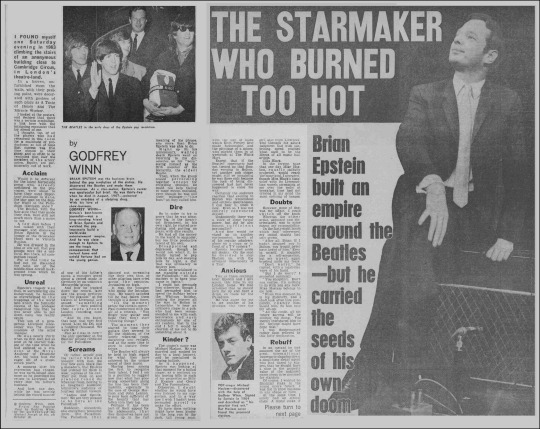

‘THE STARMAKER WHO BURNED TOO HOT’ (The Sunday Mirror - June 14, 1970) The above piece is an extract from journalist Godfrey Winn’s 1970 autobiography ‘The Positive Hour’
Brian Epstein built an empire around the Beatles - but he carried the seeds of his own doom
By GODFREY WINN
BRIAN EPSTEIN was the business brain behind the pop revolution of the sixties. He discovered the Beatles and made them millionaires. As a star-maker, Epstein's career was spectacular but brief. He was thirty-two when he died in August, 1967 - poisoned by an overdose of a sleeping drug. With his love of show-business, GODFREY WINN - Britain's best-known journalist - was a long standing friend of Brian Epstein and watched the pop impresario build a world wide entertainment empire. And he was close enough to Epstein to see the tragic consequences that instant fame and untold fortune had on the young genius.
I found myself one Saturday evening in 1963 climbing the stairs of an anonymous building close to Cambridge Circus, in London’s theatre-land.
In a barren, unfurnished room the walls, with their peeling paint, were decorated with posters of such plays as A Taste of Honey and The Miracle Worker.
i looked at the posters, and decided that there was a certain symbolism, a link here with the intriguing encounter that lay ahead of me.
I thought, too, of all the players who had rehearsed in this room for a multitude of productions: so full of hope that success was this time almost in their grasp, and so often to be reminded that half the members of the actors’ union, Equity, are permanently out of work.
Acclaim
Would it be different for the latest Merseyside group who, already acclaimed in the provinces, were about to have their most important challenge to date, the star spot on the Sunday Night at the Palladium television show?
The Beatles, with the hair-style that they made their own, were still not much more than a name to me.
A few days before I had talked with their manager and discoverer Brian Epstein in the lounge of the Grosvenor Hotel next to Victoria Station.
He was dressed in the kind of silk suit that pop groups wore like a uniform. But there, all comparison ceased.
For at that time he had not yet discarded the solid air of the middle-class Jewish back-ground from which he was sprung.
Unreal
Epstein’s tragedy was that, in surrendering one background, he became so overwhelmed by the trappings of the world into which the fantastic success of his proteges catapulted him that he was never able to put down roots into reality again.
This son of a prosperous Liverpool store-owner was the classic example of the actor manque.
He was nearly thirty when we first met, but as soon as he started talking of the time when he had enlisted as a student at the Royal Academy of Dramatic Art, his voice had the eager lilt of a stage-struck youth.
A moment later his expression had changed. He was earth-bound once more as he described his return to Liverpool and entry into his father’s business.
And how, one day, while he was serving behind the record counter of one of his father's stores, a customer asked about a record made in Germany by an unknown Merseyside group.
And how he tracked down the record, later saw the group performing “for peanuts” at the Cavern in Liverpool, and sensed "something dynamic”; then peddled their tapes around London recording companies.
“And do you know, that tape, that very first record, Love Me Do, sold a hundred thousand. We were IN."
Just as I was in, now - the only spectator at the Beatles' private rehearsal for the Palladium.
Screams
Or rather, myself plus the tailor who had brought with him the four new suits, black like a matador’s, that Epstein had ordered for them to wear, replicas of his own. They put them on and pranced round the rehearsal room, bowing to an imaginary audience of fourteen million viewers.
“Ladies and Gentlemen: We are very pleased to be here at the Palladium.
Suddenly, uncontrollable excitement possessed them. The Palladium. The Palladium, they shouted out, screaming like their own fans, as other pilgrims have cried across the centuries. Jerusalem on high.
It was the youngest who spoke the introduction. He wasn't satisfied till he had taken them through it a dozen times.
"It's the moment before the curtain opens," Paul commented with the air of a veteran. “You finger your guitar and hope they won't start throwing things."
The moment they started to tune their guitars they seemed to fill the shadows of the lonely rehearsal room, darkening into twilight, and at the same time to grow in stature themselves.
The Beatles will always be held in high regard for what they have achieved by the unique sound of their music.
Having been among the first to recognise their talent, I feel I am in a position to suggest now that what has gone wrong somewhere along the line has been their inability, especially in the case of George Harrison and John Lennon, to pour back sufficient of the bounty that has fallen into their lap.
Perhaps it has been part of their appeal for the adolescents, that they themselves have not grown up in the full meaning of the phrase, any more than Brian Epstein was able to do.
Right up till his unnecessary, wanton death Epstein went on referring to his discoveries as his “boys,” seeing himself as the fifth member of the hierarchy, the eldest Beatle.
Then, when the group ceased performing together except for recording sessions, he could not help feeling to some extent excluded, even though he was still their manager - “the boss,” as they called him.
Dire
So in order to try to prove that he was someone big, in the theatrical firmament, in his own right, he started producing and putting on plays, with dire results.
He had all the money in the world to squander, but too little productive talent of his own.
Disappointed, and depressed, though he would not admit it, he finally turned to pep pills by day, and sleeping pills by night, a diet that was ultimately to destroy him.
Once he proclaimed to me, standing outside the Palladium: “All that matters is to have your name in lights.”
I could not persuade him otherwise, though I had persuaded him to spend the Sunday before the Whitsun holiday, making the journey all the way to Bolton in Lancashire, to hear an unknown singer in a pub, who had been recommended to me with such persistence and such enthusiasm by one of my readers, that in the end I felt it churlish of me not to do something about it.
Kinder?
The singer’s name was Michael Haslam. He was married and worked by day in a local tannery, and he specialised in singing ballads.
As it happened, Epstein was looking at that moment for a ballad singer, as a contrast on his touring bills to such of his properties as Billy J. Kramer and Gerry and the Pacemakers.
Otherwise, I doubt whether he would have ever listened to my suggestion, and in a way now I wish I hadn’t been persuaded myself to make the effort.
To have done nothing might have been kinder in the long run to the dark, tall young man, with the sort of looks which Elvis Presley first made fashionable, and the physique of a miner, who packed them in at weekends at The White Hart.
Except that if the Beatles’ impresario had not turned up that Sunday evening in Bolton, yet another pub singer might still be imagining he was there only because the luck of being discovered had just never happened to come his way.
Certainly the audience reaction that evening in Bolton was tremendous and entirely spontaneous. I can hear it, smell it how. Even so, I was not entirely convinced myself.
Undoubtedly there was a voice of some lyrical power, but did he also possess sufficient personality?
And how would he stand up to another environment, bereft of his regular admirers, alone on a stage, or in front of a TV camera?
Epstein brushed aside my doubts. On the spot he decided to sigh Haslam up, with the arrogant impetuosity of a Tsar.
Anxious
Two or three evenings later, Epstein and I met again, this time in my London home. We had arranged that he should pick me up and have a drink, en route for the Palladium.
He was eager for me to see another of his proteges, This time the girl, also from Liverpool, who through his astute judgment had with surprising sped reached what used to be the Mecca of all music hall artists.
Cilla Black.
In the fervent hope that one day Mike Haslam, equally skilfully projected, would reach the same goal, I accepted, though Miss Black’s nasal voice with its Liverpudlian vowels screaming at me over the radio at breakfast time had not created in my mind the most enticing of images.
Doubts
However, none of that was my affair. I could switch off the knob.
Whereas the other artist, uprooted and disorientated, was to some extent my responsibility.
In the forty-eight hours which had intervened, my initial doubts had only grown.
“After all, Brian, if I hadn’t dragged you to Bolton, you would never have heard of him.” Even to myself, it sounded like a self-accusation, but my guest again brushed aside my fears.
“Don’t worry,” he replied, with a rajah-like wave of his hand.
“But I do worry,” I protested anxiously.
“You shouldn’t. Don’t you realise, it’s nothing to do with you anymore. Mike Haslam belongs to me now.
“From this moment he is my discovery, and I shall look after him completely, change him, mould him, fit him into my set-up.
“All the credit, all his future success will be entirely my doing. You merely introduced him to me. Anyone might have done that.”
I was flabbergasted rather than relieved by this lofty declaration.
Rebuff
In an instant he had assumed the air of the great, international impresario slapping down a small-time sleazy agent who had dared to suggest that he should have a slice in the property value of the unknown name about to be groomed for stardom.
Of course, I wanted no financial stake in the young man’s future. I was not in show business in any shape or form.
At the same time, I surely had an ethical stake. A moral stake, if you like. Anyway, something quite different and rather more binding.
But I was meeting the real Brian Epstein for the first time.
Gone was the mask of mock humility, worn by the apparently modest young man fresh from the provinces, who in his original talk with me had praised and congratulated everyone except himself.
For the first time I glimpsed the strong streak of paranoia, which was swiftly to grow into a kind of sickness.
Welcome
Not surprisingly, I was dismayed and we had an uncomfortable evening, saved, as far as I was concerned, by the affectionate welcome I received in the dressing room of Frankie Vaughan, who was the real star of the show.
He and the boys in the band were deep in a poker session, but the occupant of the coveted No. 1 room broke off without a trace of annoyance and jumped up from his seat to offer us drinks.
How different had been my reception in the No. 2 dressing room.
Miss Black was seated in an ungainly position, her legs sprawled out in front of a portable television set, and did not trouble to get out of her chair, or to make any attempt at conversation.
After a few embarrassed moments, I backed out into the passage again, and it was then, at my suggesting that surely his new girl needed a matronly, experienced woman in attendance to help and advise her back-stage, that Epstein made the comment that having your name in lights was the only thing which mattered.
I expect he thought my suggestion was an impertinent one, though it was only intended to be constructive.
Unfortunately, I had already promised to have supper with him afterwards, and then to see his new house, and Miss Black, dressed in a black leather coat, more suitable for the back of a motor-cycle, came along, too.
Surprise
Not wishing to lie openly about my reactions to her performance, and searching for some topic of conversation which would be of mutual interest, I asked my host if he was contemplating adding any other female singers to the troupe of artists under his banner.
I am still surprised when I recall the reply I received, uttered with absolute and final conviction.
“No, I do not need any other women artists. Cilla is the Edith Piaf of England.”
Whatever she was or has become - and Miss Black has undoubtedly achieved a large and loyal following among her contemporaries - she is not another Edith Piaf, that great Parisian singer. How could she be?
Despite all Epstein’s confident assertions, Mike Haslam failed to float for long in the larger pool.
Symbols
Even while he was still alive I never talked with Brian Epstein alone again, after that evening at the Palladium, when in the small hours I found myself standing in a room in his house dominated by a row of telephones of different colours on a long desk.
Nothing else about the house, the modernistic innovations of which suited his temperament, left any mark upon my memory.
Only the telephones, those inanimate props of a tycoon existence, stare at me like a blown-up photograph on my desk. The symbols and instruments of a certain kind of power.
“I lift one receiver,” he told me exultantly, “and say to the operator ‘Get me a Hollywood number.’ I book in that call, and five minutes later I am talking to New York.
“Hardly have I rung off, when it is Australia on the line. Everyone wants me, everyone wants the Beatles. Everyone wants all my boys.”
“What about the time factor?” I asked. “For instance, when it is mid-day here, and perhaps three o’clock in the morning there, or vice-versa?”
“I don’t mind about that. I am ready to take calls all round the clock. I like it best sitting here by myself through the night, doing business. Big business.”
His usually deceptive, quiet voice rose to a crescendo: he was playing the big scene in the third act from all the stage and screen dramas of which he had been cheated by his inability to make the grade as an actor in the legitimate theatre.
But I had no desire to play in turn the part of the stage stooge, and fled from that house in Kinnerton Street to walk home through Belgrave Square, where at the corner of Chapel Street and Groom Place the nocturnal life of the fifth Beatle was finally to snuff out in the last of his London homes, whose larger rooms he had furnished in even more grandiose style.
Some months before that happened, he had a breakdown, which was hushed up, and then they put him in a private nursing home at Roehampton, in Surrey, which caters particularly for patients whose minds have been temporarily disturbed.
Guarded
After that he was never without a friendly and considerate bodyguard, who became his shadow.
Except on that final weekend when, in a sudden change of mood, he decided to drive himself from his country home at Heathfield, Sussex, back to London, though it was a bank holiday.
The Chapel Street house was only a stone’s throw from where my elder brother lives, and sometimes, when I was dining with my family, my sister-in-law, more in bewilderment than disapproval, would comment:
“Such strange people hang about Mr. Epstein's house.
“I suppose they are waiting, hoping that one of the Beatles will come out.”
That Sunday afternoon, when the news of his death broke, and the police cars drove up, the flower boys and girls in their peacock clothes left the Kings Road parade and crowded into Chapel Street, as though they were queueing up for a pop concert.
As far as I was concerned the epitaph was spoken by David Jacobs - not the disc jockey but the lawyer, with the looks himself of a film star - who acted for so many other names in show business beside the Beatles.
Freedom
Now that it was all over, the final battle lost, Epstein's adviser from the start spoke to me with a freedom he could not have done before:
“The trouble with Brian was that he had everything, and yet nothing.
“He had a strong family feeling, right till the end, and his loyalty towards the Beatles and his other properties, like Cilla Black, was fantastic.
“I suppose you could describe it as a kind of love affair on his side, but nothing stands still in life, and he was conscious that they were inevitably growing away from him, as they matured both as artists and people.
“This made him more and more restless and unhappy, though he wouldn’t admit it except in one of his increasing moods of depression, when all I could do was to remind him how much he was worth, in money and properties.
“But even that knowledge began to lose its flavour. It was then that he started taking pills to try to recapture the sense of euphoria he had had at the beginning.
“It was imperative for him to feel that he was still in the swim himself, not just taking a percentage of their earnings.
“I hoped so much that the house at Heathfield would make a difference.
“He had gone down that weekend for the Bank Holiday. But after dinner on that Friday evening, he suddenly changed his mind and drove himself back to London, alone.
“What would I have done had I known? It’s always so easy to be wise after the event.
“Sometimes one has a kind of instinct, and can act swiftly, but even then it can be too late, or impossible to protect the person indefinitely against himself, if the seeds of self-destruction are strongly developed in him or her.
“In this case we shall never know for certain exactly what happened. Except that he went to sleep again that night, and never woke up.
Loner
“In a way, I was closer to him than anyone. He really unburdened himself to me.
“He was not so much a loner, as a oncer.
“What do I mean by that? I mean that he was incapable of any lasting physical relationship with anyone. He was incapable of love.”
All too soon David Jacobs himself was to discover his own torments.
#Brian Epstein#Godfrey Winn#The Positive Hour#Cilla Black#Michael Haslam#David Jacobs#Sunday Mirror#newspaper#1970#70s
43 notes
·
View notes
Photo






John Lennon, Paul McCartney, George Harrison and Ringo Starr did not provide the voices for their cartoon counterparts in Yellow Submarine (1968), directed by George Dunning. George was born in Toronto and had 18 credits, from four 1944 shorts, to an uncredited 1972 short. All George’s other credits are for shorts.
This post was just censored for violating tumblr’s community standards. When it was appealed and viewed by a tumblr human, the human determined that the Beatles cartoon with no nudity or violence did not violate their censorship standards. Any guesses what might have triggered tumblr’s bots in any of these images?
9 notes
·
View notes
Photo

Famous Muses & Groupies in Rock Music Pt. 3
GROUPIE: Lori Mattix/Maddox (modeling name Lori Lightning)
Researching this woman is honestly such a headache that I almost wasn’t even sure where to start….So I guess we’ll begin with everything we know to be definite fact. Lori was born on November 11th, 1958, and raised in Los Angeles with her single mother and three sisters. By the time Lori was in middle school, her mom (supposedly a talent agent or a waitress depending on the source) started signing Lori up for photoshoots in music magazines like Creem and Star (a vintage groupie rag, not the modern tabloid). In these photos, Lori was usually posing in skimpy outfits with fellow teen models and friends Sable Starr, Shray Mecham and Karen Umphrey to appeal to the rock music scene. From these modeling gigs and her friendships with baby groupies Sable and Queenie Glam, Lori very quickly spent nearly all her free time at clubs on the Sunset Strip from about 1972-75. She’s possibly the most profiled and interviewed baby groupie from back then, and still lives in LA running her own clothing boutique when she isn’t glamorizing her groupie days as ‘the best time ever’ or whatever.
[Note: this entry ended up three pages long….Good luck following this mess]
Besides this, everything regarding Lori’s reputation as a teen rock groupie gets very muddled and confusing. During an interview in 1985 with writer Stephen Davis for the sensationalist Led Zeppelin biography Hammer of the Gods, Lori states that she was with Jimmy Page from 1972 to ’75 and he was the only rockstar she was involved with. But in Pamela des Barres’ 2007 groupie compilation Let’s Spend the Night Together, Lori claims she lost her virginity to David Bowie and Sable in a threesome before she met Jimmy, and that she hooked up with a ton of musicians. In the 2010 filmed version of Pamela’s book, Lori makes no mention of Sable being involved in her alleged incident with Bowie. In the 2004 documentary A to Zeppelin, Lori sloppily says she was “a vir—I mean come on, I was like a baby then,” when she met Jimmy. In a 2015 interview with the publication Thrillist, Lori claims she originally turned down Bowie after he propositioned her and didn’t sleep with him until 1973, even though she occasionally suggested that the incident was more likely to be late 1971 or early 1972. She also claims in this article that she continued to keep in touch with Bowie intimately for the rest of the decade, when previously she suggested it was only a one-night stand.
The people over at Medium penned a rather informative expose in 2016 on how inaccurate her stories are on her alleged hook-up with Bowie based on date history. Though it should be noted the piece doesn’t include that in the 1997 punk scene biography Please Kill Me, Sable participated in a rare interview where she revealed she and Lori did meet Bowie in 1973. But Lori got cold feet at the last minute, and only Sable ended up fooling around with the musician. The journalist of the Medium article also gives Lori a little too much credit on the legitimacy of her affiliation with Jimmy Page, as there are a lot of contradictions there too.
As has been reported by multiple sources, Jimmy infamously left his main US groupie Pamela des Barres for Lori while the three of them were partying on the Strip when Zeppelin was in Hollywood. Pamela usually says this happened at the Whisky a Go-Go in either 1972 or 1973. There is photographic proof of Jimmy, Pamela and Lori together at the English Disco that was originally credited on Getty Images as John Bonham’s 24th birthday party on May 31st, 1972. But the only problem is that the band was not in California the week of his birthday, and only played in the state for the last week of June. Zeppelin was however in Los Angeles on his birthday the following year, and the band’s hair and wardrobe in the party pictures match closer to how they looked in summer ’73 rather than ’72. The incident also seems more likely to have happened in ’73 as Lori was Jimmy’s date to a press event at the Continental Hyatt House sometime in June 1973. Both Jimmy’s and Lori’s hairstyles there are identical to how they looked in the English Disco photos as well.
On the 2007 DVD Way Down Inside, Lori says she first met Jimmy randomly at a pool party on the roof of the Hyatt House. In the Let’s Spend the Night Together documentary, she says she met him backstage at the Hollywood Palladium. In the book version and in Thrillist, she claims he personally called her house to introduce himself—but in LSTNT she says they first physically met clubbing at the Whisky before hopping over to the Hyatt House, while in the 2015 interview she says she met him in person at the Hyatt House and then they left to party at the Rainbow. In A to Zeppelin, she claims that Jimmy contacted publicist Lee Childers to set up a date for her to meet the band after he saw one of her photoshoots, rather than call her personally. On Instagram, Lori posted one of the photos of herself with Jimmy and Pamela at the English Disco with a caption stating that was the night she was introduced to Jimmy. If the two did meet backstage, it would have had to have been on either May 31st or June 3rd, 1973 when the band played the LA Forum, as LZ never performed at the Palladium. If he did set up a supposed date, it was probably the night he dumped Pamela. The pool party claim would also make sense, as the week Jimmy and Lori met, the infamous episode where Bonzo threw George and Pattie Harrison into a pool during his birthday party also happened. Except apparently this party was in Laurel Canyon, not at the Hyatt House, and Lori has never been name dropped in retellings of that story.
Besides the month of June in 1973, the only other confirmed time Jimmy and Lori were together is the week of May 10th, 1974, when Jimmy ditched her at the Swan Song label opening party in LA for older groupie Bebe Buell. Bebe went into detail in her 2001 memoir Rebel Heart, of how Lori became hysterical when she realized Jimmy was leaving her for Bebe. The model recalled Lori jumping her and wildly pulling her hair in anger at Bebe ‘stealing’ Jimmy from Lori. Lori conveniently leaves this accusation out when she talks about the break-up. So this is about four to five weeks in Los Angeles when Lori could have socialized with Jimmy, and quite possibly the only times they saw each other in 11 months.
In Hammer of the Gods, Lori asserts she was secretly on tour with the band for two years. Except that between June 1973 and May 1974, the band was only on tour for a month in July. In the novelized Let’s Spend the Night Together, she insists Jimmy arranged to have her visit him in NYC whenever he wasn’t in LA. Lori would eventually completely backtrack ever traveling as a teen and claim she only saw Jimmy when the band was in LA. In the Thrillist piece, she claims that they would travel back to Hollywood after every show and spent the whole summer of 1973 in the city. Not only did the band reportedly spend the last week of touring staying at NYC’s Drake Hotel, but journalist Lisa Robinson tagged along on this tour, and remembers LZ spending nights in a lot of major US cities. Lori’s also infamously said numerous times that she had to be kept locked up (either on tour or in his LA hotel room depending on the interview) while she was with Jimmy because she was underage. Seeing as how there are three different sets of famous party pictures of the pair posing together, taken by professional photographers and originally published the years they were shot, that doesn’t make much sense.
In both Hammer of the Gods and Way Down Inside, Lori says she was kidnapped by LZ roadie Richard Cole, who allegedly yelled at her to get into his car before taking her to Jimmy’s hotel room. In the Thrillist piece, she says Zeppelin manager Peter Grant was the kidnapper and he tossed her into their limo. In a Q&A Lori participated in after the premiere of Let’s Spend the Night Together in 2010, she suggests Jimmy himself kidnapped her. (In the same Q&A, Lori also says that Jimmy broke up with her when she was ‘16’ right after the FBI got involved with the band’s hotel safe theft in NYC. But this obviously isn’t true, as the FBI incident was only two months after she met Jimmy in 1973.) In A to Zeppelin, she makes no mention of any kidnapping and says she just followed him back to his room. Lori has also continually asserted that she and Jimmy spent the rest of the night in his room ~falling madly in love.~ 🙄
Lori says in the Thrillist piece that she had to hide when Zeppelin went back to LA after the FBI got involved in a theft from the band’s hotel safe in NYC at the end of July 1973. In Let’s Spend the Night Together, she erroneously states that the theft happened in 1975, right after she was flown out to visit Jimmy, and then quickly forced to go back home. But many biographies, including A to Zeppelin, report that the band just went back to England after the FBI episode without any mention of Lori. There are photos of Lori partying with musicians after the theft, but most of them are with Iggy Pop and the New York Dolls in LA.
It is also interesting to note that of all the pictures of Lori with musicians from 1973-75, the rockstar she was photographed with the most is Sylvain Sylvain of the NY Dolls. The two of them are even featured in the documentary All Dolled Up (2005) partaking in PDA in vintage 1973 footage. But funny enough, she’s never talked about Sylvain in interviews. Probably because all the photos and footage of them together were at the same time frame she knew Jimmy, and that disputes her story of how she and Jimmy were committed to each other the whole time they were together.
Other things that are likely fake/made up by Lori:
In most interviews, Lori claims that her mom gave Jimmy her blessing to go out with her teenage daughter because he didn’t have a criminal record and ‘wasn’t a terrorist.’ I mean…I guess this could be true, but it has to be the worst excuse I’ve ever heard of a parent letting her 14-year-old child date a man pushing 30.
In the Let’s Spend the Night Together book, Lori has a story of how Jimmy once saw her smoking a cigarette, then forced her to smoke a whole pack, and that made her never smoke again. Three months after Jimmy dumped Lori, she was photographed smoking at Keith Moon’s 28th birthday party, as well as in a personal picture from the early 1980s.
Lori likes to brag about how Robert Plant and Jimmy would dedicate concerts to her while she was with Jimmy, but within the 11 months they were familiar with each other, there were only two shows in LA. Both at the Forum on May 31st and June 3rd, and neither known bootleg recordings of either show feature any shout outs to her.
Lori has gone as far as to say that when she was in LA and Jimmy was back in the UK, he would call or write her every day. Seeing as how in 1973-74, Jimmy was in another country writing, recording and producing songs on the album ‘Physical Graffiti;’ living with model Charlotte Martin and their daughter Scarlet; and having an additional affair with Krissy Wood, he might have been a bit too busy to include some teen halfway across the world. Lori also claims that Jimmy had to choose Charlotte over her because they had a toddler together, and that he would be a jerk to Charlotte to prove he loved Lori. (Never mind the fact that Lori simultaneously calls Jimmy the ‘sweetest’ man ever.)
Some articles and blog posts state Lori and Jimmy got back together for a while in the ‘80s, but this conflicts with Jimmy’s own relationship history as there were only two years in between his separation from Charlotte in 1983 and the meeting of his first wife Patricia Ecker in 1985. On top of that, whenever he would visit the US in the ‘80s when he wasn’t with Charlotte or Patricia, he was usually with a photographer named Ashley Hamm. (Could this man be anymore promiscuous.) A few times, including in Thrillist, Lori has said she still keeps in touch with Jimmy. Yet he has never mentioned her publicly and there have never been any personal photos of them together, such as on Lori’s social media, where she’s posted photos of herself reuniting with Pamela, Rodney Bingenheimer, Robert and Sylvain in modern times.
A lot of LZ books and posts state that the song ‘Sick Again’ is about Lori and her fellow baby groupie friends. This…actually is true, but the tone of the lyrics is intentionally sarcastic as Robert was known to be one of the few rockstars that era not interested in teen girls. He even said in a 1975 Rolling Stone interview that he felt sorry for the Star girls revolving their lives around how many celebrities they could meet.
TL;DR: Lori was a real, legit groupie in the mid-1970s. There are enough pictures of her with dozens of celebs and other groupies to vouch for that. Feel free to judge these adult men for getting involved with teenagers, they mostly deserve it. But it’s also pretty obvious this woman was not in serious, long-lasting, or romantic relationships with any of these rockstars and just likes being famous, no matter what context. (And she is a terrible, terrible storyteller).
#lori maddox#lori mattix#lori lightning#groupies#jimmy page#David Bowie#sylvain sylvain#omg this took so fucking long to research/write/edit/double check#you're welcome...#musesandgroupiesseries
368 notes
·
View notes
Text
Look Away
A timid and socially alienated 17-year-old high school student’s life is turned upside down when she switches places with her sinister mirror image.  Credits: TheMovieDb. Film Cast: Maria Brennan / Airam Brennan: India Eisley Dan Brennan: Jason Isaacs Amy Brennan: Mira Sorvino Lily: Penelope Mitchell Mark: John C. MacDonald Sean: Harrison Gilbertson Naomi: Kristen Harris Ginny – Woman at Clinic:…

View On WordPress
0 notes